| Srl | Item |
| 1 |
ID:
154705
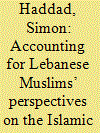

|
|
|
|
|
| Summary/Abstract |
This article seeks to determine the correlates of Lebanese Muslims perceptions of the Islamic State (ISIS) which are measured using the hypotheses that commitment to political Islam, young age, education and occupational status would predict approval of ISIS. In view of the accentuated polarisation between Sunnis and Shiis along sectarian lines, it is proposed that dislike for the Shiis would enhance the level of support for ISIS. The study was based on a cross-sectional survey Lebanese Muslims (N = 302) administered during the fall of 2015.The suggestion is that adherence to the tenets of political Islam, sectarianism and educational attainment are major predictors of endorsement for ISIS.
|
|
|
|
|
|
|
|
|
|
|
|
|
|
|
|
| 2 |
ID:
074682
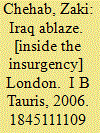

|
|
|
|
|
| Publication |
London, I B Tauris, 2006.
|
| Description |
x, 277p.hbk
|
| Standard Number |
1845111109
|
|
|
|
|
|
|
|
|
|
|
|
Copies: C:1/I:0,R:0,Q:0
Circulation
| Accession# | Call# | Current Location | Status | Policy | Location |
| 051867 | 956.70443/CHE 051867 | Main | On Shelf | General | |
|
|
|
|
| 3 |
ID:
107154
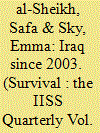

|
|
|
|
|
| Publication |
2011.
|
| Summary/Abstract |
The US-led invasion of Iraq in 2003 had a traumatic effect on Iraqi society, causing it to break down into different armed groups that at times fought the US-led Coalition, the new government, members of other sects and even members of the same sect in a nation-wide conflict that claimed the lives of well over 100,000 Iraqis. While this violence has since decreased, Iraq's stability gains remain fragile, and the country's future is uncertain. To understand why there was so much violence in Iraq after 2003, and why the violence eventually decreased, it is important to examine the contending perspectives of the different groups, in particular Sunni insurgents, the central government in Baghdad and the followers of Shia leader Moqtada al-Sadr (known as Sadrists).
|
|
|
|
|
|
|
|
|
|
|
|
|
|
|
|
| 4 |
ID:
154427
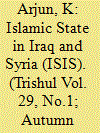

|
|
|
| 5 |
ID:
108337
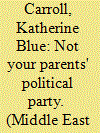

|
|
|
| 6 |
ID:
063024
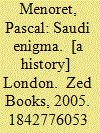

|
|
|
|
|
| Publication |
London, Zed Books, 2005.
|
| Description |
xi, 257p.
|
| Standard Number |
1842776053
|
|
|
|
|
|
|
|
|
|
|
|
Copies: C:1/I:0,R:0,Q:0
Circulation
| Accession# | Call# | Current Location | Status | Policy | Location |
| 049787 | 953.8052/MEN 049787 | Main | On Shelf | General | |
|
|
|
|
| 7 |
ID:
127226
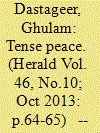

|
|
|
| 8 |
ID:
174495
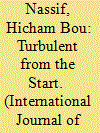

|
|
|
|
|
| Summary/Abstract |
This article reconsiders military politics in Syria prior to the 1963 Baʿthi power grab in light of new sources. I undermine the presumptions that Baʿthi tactics of sectarian favoritism in the armed forces were unprecedented in post-independence Syria. I make the following arguments: first, attempts by the Sunni power elite to tame Syrian minorities were part of a broad sequence of events that spanned several regimes and informed politics in the Syrian officer corps; second, the various military strongmen who ruled Damascus intermittently from 1949 until 1963 distrusted minority officers and relied mainly on fellow Sunnis to exert control in the armed forces; and third, the combination of minority marginalization in Syrian politics and Sunni preferentialism inside the armed forces bred enmity and polarized sectarian relations in the officer corps.
|
|
|
|
|
|
|
|
|
|
|
|
|
|
|
|